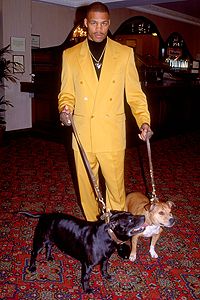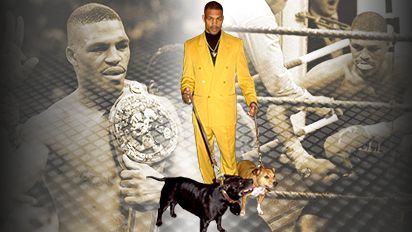lol @ people sayin he got what he deserved. mother****as all over the globe eat dogs. Should they be eatin???
Look, I'm not saying dog fighting is a good thing or not, I really don't care, but put things in perspective a bit - during the time g-man was growing up, his neighborhood was big on dog fighting. So big in fact it wasn't uncommon for hundreds of people to watch a dog fight with $100,000+ on the line. that's the way it was. Was that right? It doesn't matter and it shouldn't concern you, that's the environment HE was brought into, he was raised into that. Dog fight, **** fighting (Roy Jones anyone???), etc. are cultural things. If you're born into it, chances are you'd be into it too. no matter how hardcore peta ur ass might be.
But, there was a soft side to g-man. He loved his dogs, especially deuce and when he lost a fight, he cried and took it home and tried hard to fix him up. He was depressed for weeks when his dog died. Who knows maybe that's when he realized he didn't want to be involved in that **** no more.

From ESPN for further reading:
He's done a few things he never imagined doing. The first time he went to a dogfight with McClellan, he felt sick and scared.
"Then," he says, "I kind of got into it.
"I don't know … it's just a competition, and it's like a race, a fight. You'd be surprised at what my eyes have seen."
Johnson said he saw nine or 10 dogfights in all, some lasting 45 minutes, others so bloody McClellan walked out looking as if he'd been in a gunfight. Once, after McClellan's dog lost, Johnson watched his friend coldly pull a 9 mm gun out of his pocket and fire into the dog's head.
And then he saw a much gentler side of McClellan when it came to Deuce. When the dog was losing, McClellan screamed to stop the fight.
"He gave the man his money, picked Deuce up and threw him over his shoulder," Johnson says. "He was crying all the way home, petting his dog, saying he would never do it again.
"He was driving a green Mercedes Benz. Blood was all over the car. Deuce's neck was tore out, and you know what Gerald did? He sewed his neck up himself with a needle and thread. And that was the last dogfight I went to with Gerald."
[...]
The town of Freeport has a Farm and Fleet store, an outdated Wal-Mart and a sleepy-looking high school with a not-so-menacing nickname of "The Pretzels."
Signs around town remind strangers that Freeport was the site of a Lincoln-Douglas debate. On a sunny summer afternoon, the downtown is quiet, save for the sound of birds chirping and folks stopping to say hello.
But up the railroad tracks, on the east side, lies a darker history. Penelton says they had dogfights there in the early to mid-1990s, drawing as many as 150 people, throwing around more than $10,000. The woods and cornfields provided the perfect cover; the Pecatonica River gave them a place to wash the bloody dogs after their battles.
"Wasn't nobody going to say nothing," Penelton says. "We had all the money."
A big misconception of dogfighting, Goodwin says, is that it's rooted in the South. But places such as Detroit and Chicago long have been considered hot spots, and Penelton says he's seen as much as $200,000 wagered at a dogfight in Detroit.
"If people found out how big it was, they'd be shocked," Penelton says. "These guys come to a dogfight like they're going to a beauty pageant or the Oscars. That's how they dress up, diamonds and bling bling. You'd think Michael Jackson or Stevie Wonder was showing up.
"Lots of athletes. Lots of professional boxers, a lot of basketball players. I've seen quite a few of them, too. I don't want to put a name out there."
Penelton, who also boxes and trains, says McClellan got his first taste of dogfighting when he was 11 or 12 and watched a group of kids try to get a wild dog to fight. It escalated to McClellan's owning six dogs as an adult, and limiting his lifestyle.
full article:
Look, I'm not saying dog fighting is a good thing or not, I really don't care, but put things in perspective a bit - during the time g-man was growing up, his neighborhood was big on dog fighting. So big in fact it wasn't uncommon for hundreds of people to watch a dog fight with $100,000+ on the line. that's the way it was. Was that right? It doesn't matter and it shouldn't concern you, that's the environment HE was brought into, he was raised into that. Dog fight, **** fighting (Roy Jones anyone???), etc. are cultural things. If you're born into it, chances are you'd be into it too. no matter how hardcore peta ur ass might be.
But, there was a soft side to g-man. He loved his dogs, especially deuce and when he lost a fight, he cried and took it home and tried hard to fix him up. He was depressed for weeks when his dog died. Who knows maybe that's when he realized he didn't want to be involved in that **** no more.

From ESPN for further reading:
He's done a few things he never imagined doing. The first time he went to a dogfight with McClellan, he felt sick and scared.
"Then," he says, "I kind of got into it.
"I don't know … it's just a competition, and it's like a race, a fight. You'd be surprised at what my eyes have seen."
Johnson said he saw nine or 10 dogfights in all, some lasting 45 minutes, others so bloody McClellan walked out looking as if he'd been in a gunfight. Once, after McClellan's dog lost, Johnson watched his friend coldly pull a 9 mm gun out of his pocket and fire into the dog's head.
And then he saw a much gentler side of McClellan when it came to Deuce. When the dog was losing, McClellan screamed to stop the fight.
"He gave the man his money, picked Deuce up and threw him over his shoulder," Johnson says. "He was crying all the way home, petting his dog, saying he would never do it again.
"He was driving a green Mercedes Benz. Blood was all over the car. Deuce's neck was tore out, and you know what Gerald did? He sewed his neck up himself with a needle and thread. And that was the last dogfight I went to with Gerald."
[...]
The town of Freeport has a Farm and Fleet store, an outdated Wal-Mart and a sleepy-looking high school with a not-so-menacing nickname of "The Pretzels."
Signs around town remind strangers that Freeport was the site of a Lincoln-Douglas debate. On a sunny summer afternoon, the downtown is quiet, save for the sound of birds chirping and folks stopping to say hello.
But up the railroad tracks, on the east side, lies a darker history. Penelton says they had dogfights there in the early to mid-1990s, drawing as many as 150 people, throwing around more than $10,000. The woods and cornfields provided the perfect cover; the Pecatonica River gave them a place to wash the bloody dogs after their battles.
"Wasn't nobody going to say nothing," Penelton says. "We had all the money."
A big misconception of dogfighting, Goodwin says, is that it's rooted in the South. But places such as Detroit and Chicago long have been considered hot spots, and Penelton says he's seen as much as $200,000 wagered at a dogfight in Detroit.
"If people found out how big it was, they'd be shocked," Penelton says. "These guys come to a dogfight like they're going to a beauty pageant or the Oscars. That's how they dress up, diamonds and bling bling. You'd think Michael Jackson or Stevie Wonder was showing up.
"Lots of athletes. Lots of professional boxers, a lot of basketball players. I've seen quite a few of them, too. I don't want to put a name out there."
Penelton, who also boxes and trains, says McClellan got his first taste of dogfighting when he was 11 or 12 and watched a group of kids try to get a wild dog to fight. It escalated to McClellan's owning six dogs as an adult, and limiting his lifestyle.
full article:


Comment